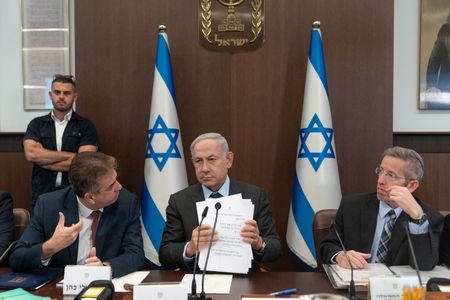 1
1 1
1
By Dan Williams
JERUSALEM (Reuters) – Israeli Prime Minister Benjamin Netanyahu pledged to crack down on Monday against threatened no-shows for military reserve duty by opponents of his judicial overhaul plan, saying such actions were anti-democratic and risked emboldening the country’s foes.
With the religious-nationalist coalition set to ratify a key reform before parliament goes on summer recess on July 30, the opposition has stepped up a half-year-long protest campaign and there have been threats by some reservists to refuse call-ups.
That has jarred a country for which the conscript military, which draws on reserves in wartime and requires they undergo regular training, was long an apolitical issue to rally around.
“The government won’t accept insubordination. The government will act against it and will take all necessary steps to ensure our security and our future,” Netanyahu told his cabinet, without elaborating on possible measures.
With Israeli-Palestinian violence surging and a spate of recent confrontations on the Lebanese frontier, Netanyahu cast the reservist action as “eroding our ability to deter our enemies who can easily be tempted to attack us”.
“We cannot have a group within the military threatening the elected government: ‘If you do not do as we say, we will shut down security,'” he said. “No democratic country can accept this dictate.”
Critics of the judicial overhaul plan say it is Netanyahu who is threatening democracy by removing checks and balances.
The reform bill reining in some Supreme Court powers, due for ratification next week, “will open a direct path to dictatorship”, said an letter signed by 1,700 former air force officers, including 27 retired generals, which was published in the biggest-selling Israeli daily Yedioth Ahronoth on Wednesday.
Petitions have circulated purportedly signed by thousands of reservists who plan to refuse orders. In some, the names have been redacted. Verifying the identities of the petitioners, and that they are genuinely subject to mobilisation, is difficult.
Asked for figures, an Israeli military spokesperson said only that as part of the protests “incidents of absences among reservists when called for duty are very limited (and) sufficiently handled by the commanders”.
A former air force officer heading a group of reservist pilots and navigators opposed to the judicial overhaul told Reuters none had yet refused call-ups. Some of them previously threatened to stay away from training flights, which reserve air crews are expected to take part in weekly on a volunteer basis.
“(They) would be willing to stop their service if conditions demand it – though of course they do not want that to happen,” said the organiser, who requested anonymity. Should it happen, he said, “there would be a severe problem for the country” given about 50% of crews on air force combat missions are reservists.
Netanyahu, on trial for corruption charges he denies, backs the changes as restoring balance between branches of government.
(Reporting and writing by Dan Williams; Additional reporting by Henriette Chacar; Editing by William Maclean)